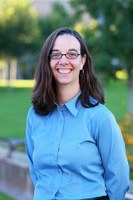New faculty member receives honorable mention at CSWE

On November 2, 2013, VCU School of Social Work faculty member Alex Wagaman, Ph.D. received an honorable mention in the 2013 Sexual Orientation and Gender Expression Scholarship Award presented by CSWE’s Council on Sexual Orientation and Gender Expression. The honorable mention was for her paper titled, Understanding Service Experiences of LGBTQ Young People Through an Intersectional Lens.
Wagaman recently joined the School of Social Work team as an assistant professor in August of this year. She came from Arizona State University where she received her Ph.D. in social work. Prior to entering the doctoral program, she practiced social work for ten years as a community organizer and an anti-oppression educator. It was during this time that Wagamen fortified her passion for social justice and the ways in which society marginalizes people based on certain aspects of their identity.
When asked why study social work, Wagaman recounted the early days in her B.S.W. program and said, “I distinctly remember feeling like I had come home. I felt like social work was in line with my own sense of what I wanted to contribute to the world, my values, my principals; especially those surrounding social justice.”
In Arizona, Wagaman volunteered at a drop-in center for local LGTBQ youth. It was here that she found the source for her research. She noticed that a large portion of the discussion at the center was around the impact of the young person’s racial identity as LGBTQ youth. It soon became clear that the young people at the center felt as though not all aspects of their identity were being considered, even when receiving much needed social services.
The majority of research focuses on the LGBTQ part of young people; not on the other pieces of who they are, and how that impacts the way in which the world sees them and how they experience the world.
Wagaman sought to gain a better understand of how the different aspects of a person’s identity affects their service experience and she set out to interview 15 LGBTQ youths.
Wagaman’s paper, Understanding Service Experiences of LGBTQ Young People Through an Intersectional Lens, is the culmination of a portion of this research and illustrates how LGBTQ young people, ages 18-24, feel they are marginalized and categorized solely based on their LGBTQ identity without considering the multiple identities that shapes their lives. Wagaman’s research shows that this marginalization not only impacts how these youth are viewed, but that it creates barriers that affect their ability to receive some social services based on aspects of their identity.
Categories From the dean